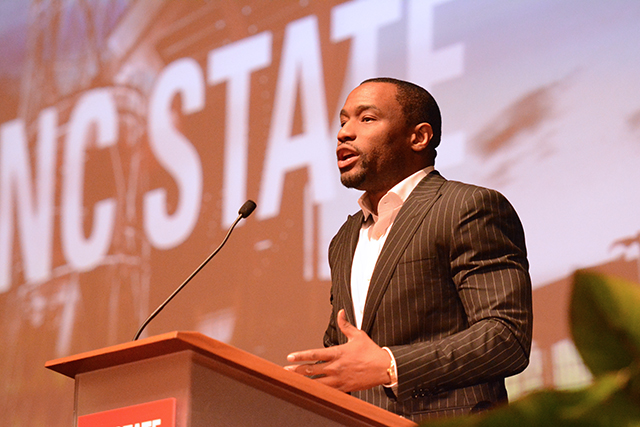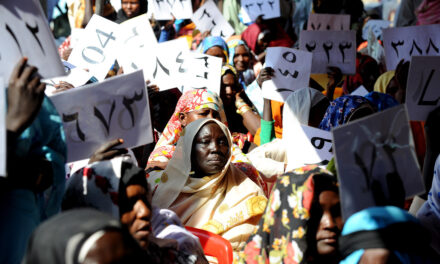Benyame Assefa | Staff Writer
On Monday, April 4, about 300 hundred students, faculty and staff stood together as Pan-Afrikan Week guest speaker Marc Lamont Hill takes the podium.
The esteemed Morhouse University professor spoke to NC State students on topics that were anxiously anticipated. The audience often seemed taken aback by the raw truths Hill had to speak on during this riveting speech.
Throughout the the event, Hill brought up ideas revolving around the notion to “not lift some, lift every,” referencing the unofficial National Black Anthem “Lift Every Voice and Sing.” Hill stated that too often, the voices of the minorities are overshadowed by one another and that as a community, we need to begin listening to one another.
According to Hill, there are often, “too many people talking and too little actually listening to one another.”
“Mistaking cacophony of noise for conversation” is where the contrast lie between the majority and the many minorities according to Hill. This was his slight reference to the Republican party, a group with which he has had plenty of interaction as a frequent guest on Fox News.
Despite individual partisan issues, it seems pertinent to see the connection amongst all of them, to unite these causes and merge these individual ideologies with another to form a larger and more cognizant voice to be heard in a more unified manner.
Hill discussed issues that weren’t really seen as interwoven. This included topics such as the environment and racism, the wealth disparity and America’s bolstering military culture. Hill’s comments regarding the environment and the well-being of the black community did not seem to cause a stir until he referenced the tragedy in Flint, Michigan.
As the murmurs and shuffling amongst the audience began, it became apparent that these seemingly uncorrelated issues, did in fact have something to do with each other.
“For the most part, I had been educated about the wealth disparity and military enlistment through some of my peers, but I never thought to correlation some environmental issues with the injustices that many African Americans face. The whole speech was a constant reminder that there’s so much to know and learn,” said Morgan Davis, a senior studying biological sciences.
The key, it seemed, to getting these smaller cries in unison and together involved action.
“Bravery” was a constant phrase ringing through the ballroom that evening.
“I had never been more excited than Ferguson,” said Hill.
The murder of Trayvon Martin seemed to be the spark for the wave of black millenianl activism according to Hill. This was an event in which he saw young people “acting bravely.”
The simplest way to to act bravely, according to Hill, is simply by acting. To act bravely, with no analysis seemed like a bad way to approach an issue, but, over-analyzing a situation and not acting seemed to disturb Hill even more.
“It was time for us to act bravely..Darren Wilson killed him [Trayvon Martin] for jaywalking…We’re tired of getting killed,” said Hill.
“Hearing Hill’s remarks on acting bravely was something that many of us in the room needed to hear. I know I needed to hear it and I feel like he left us feeling empowered,” Davis said after the event.
Opening up for Dr. Hill, Dr. Blair Kelley spoke to the audience and made the remark, “It’s a lot to be a student. It’s hard to be a teacher. It’s hard to be an activist.” Somehow, he does a good job doing all three, while also being a notably great advertiser.
You can pre-order his book, “Nobody: Casualties of America’s War on the Vulnerable,” to learn more.



